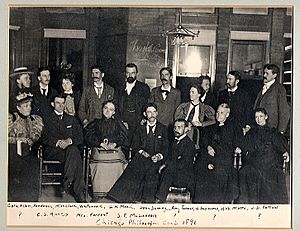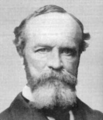Pragmatism facts for kids
Pragmatism is a philosophical tradition that began in the United States around 1870. Its origins are often attributed to the philosophers Charles Sanders Peirce, William James, and John Dewey. Peirce later described it in his pragmatic maxim: "Consider the practical effects of the objects of your conception. Then, your conception of those effects is the whole of your conception of the object."
Pragmatism considers words and thought as tools and instruments for prediction, problem solving and action, and rejects the idea that the function of thought is to describe, represent, or mirror reality. Pragmatists contend that most philosophical topics—such as the nature of knowledge, language, concepts, meaning, belief, and science—are all best viewed in terms of their practical uses and successes. The philosophy of pragmatism "emphasizes the practical application of ideas by acting on them to actually test them in human experiences". Pragmatism focuses on a "changing universe rather than an unchanging one as the idealists, realists and Thomists had claimed".
Related pages
Images for kids
-
Charles Peirce: the American polymath who first identified pragmatism
See also
 In Spanish: Pragmatismo para niños
In Spanish: Pragmatismo para niños





